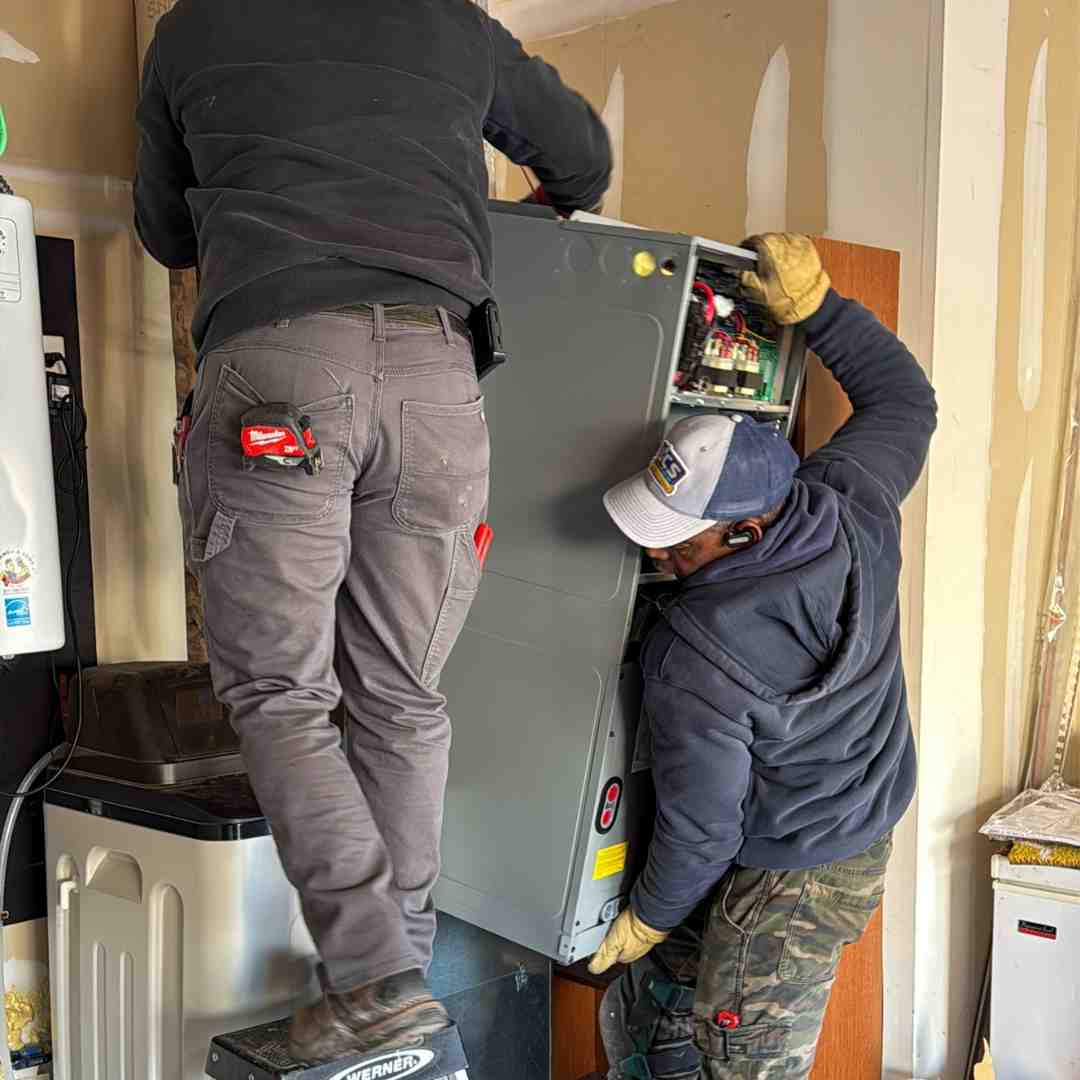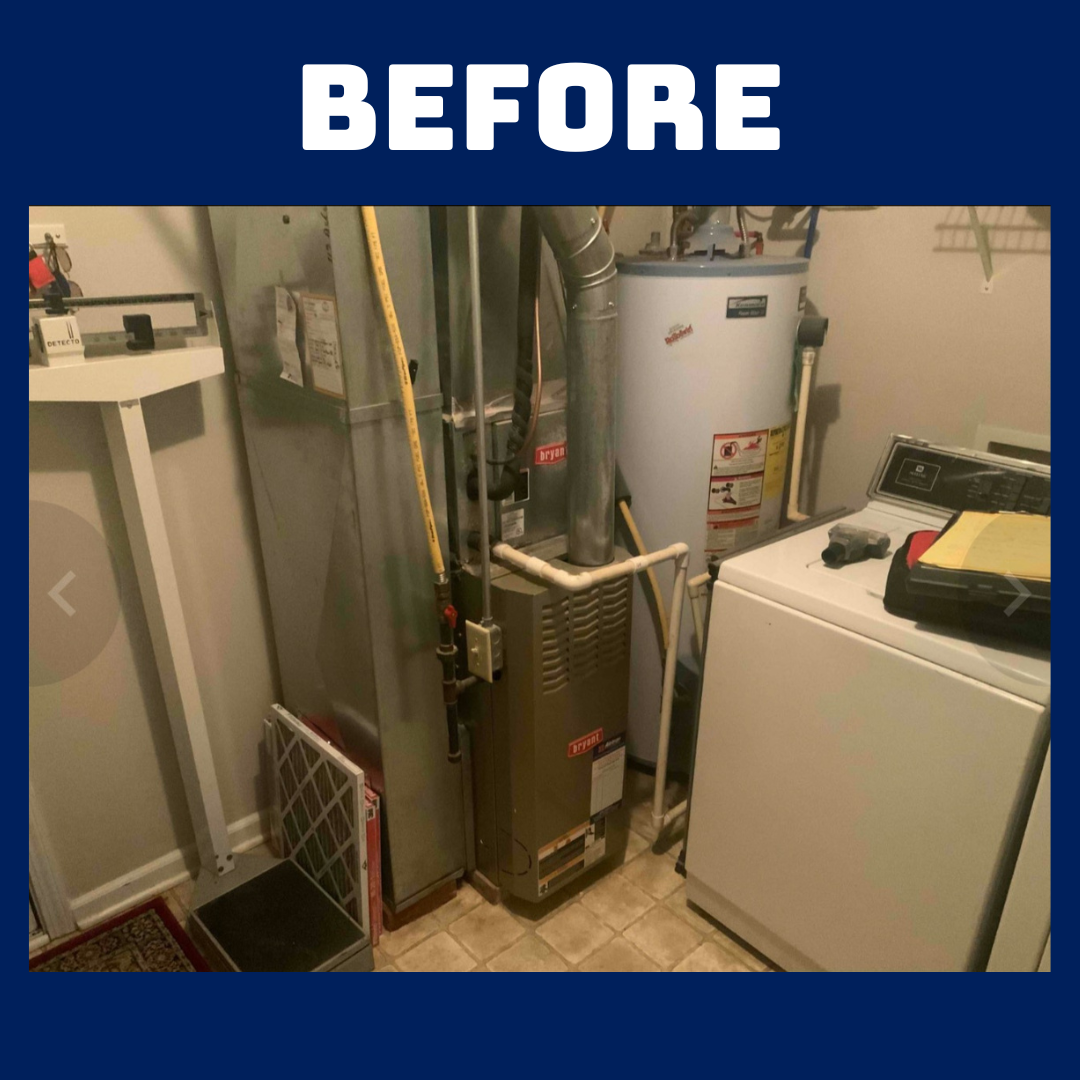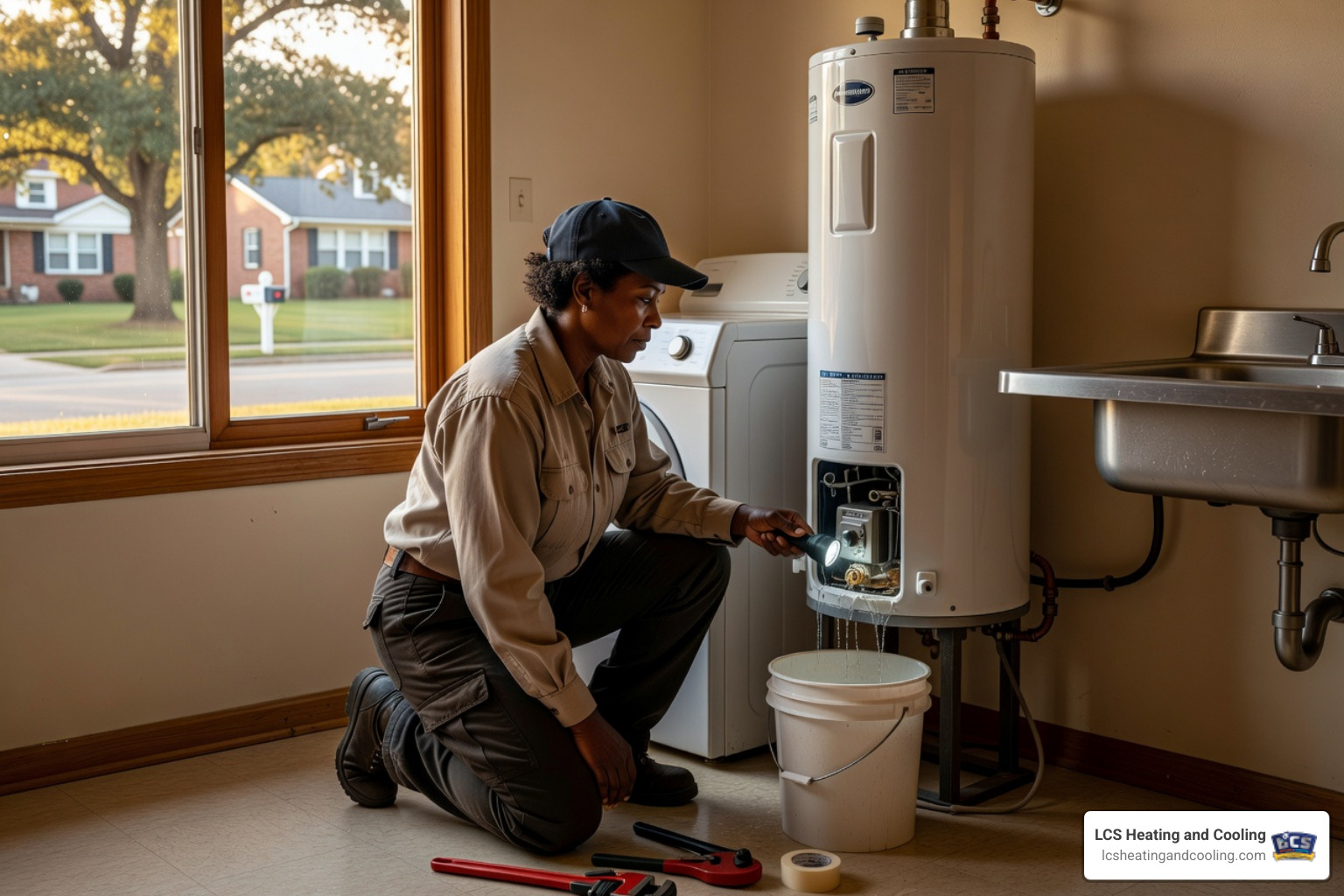The Smart Choice: Understanding Energy Efficient Heat Pumps
Why Energy Efficient Heat Pumps Are the Smart Choice for Indianapolis Homeowners
An energy efficient heat pump offers Indianapolis homeowners the ultimate solution for year-round comfort while dramatically reducing energy costs. Unlike traditional systems that burn fuel or use electric resistance to create heat, heat pumps move existing heat from one place to another - making them up to three times more efficient than conventional heating systems.
Key benefits of energy efficient heat pumps:
- All-in-one solution: Provides both heating and cooling in a single system
- Exceptional efficiency: Can reduce heating electricity use by up to 75% compared to electric resistance heating
- Year-round comfort: Works effectively even in Indianapolis winters with modern cold-climate technology
- Lower energy bills: Typical households spend around $1,900 annually on heating and cooling - heat pumps can cut this significantly
- Environmental benefits: Reduces your home's carbon footprint by using less energy
Heat pumps work by extracting heat from outdoor air (even when it's cold) and transferring it inside during winter. In summer, they reverse the process to cool your home. This heat transfer method uses far less energy than generating heat through combustion or electric resistance.
For Indianapolis homeowners dealing with hot summers and cold winters, today's energy efficient heat pumps offer reliable performance in temperatures as low as -13°F, with backup heating options available for the coldest days.
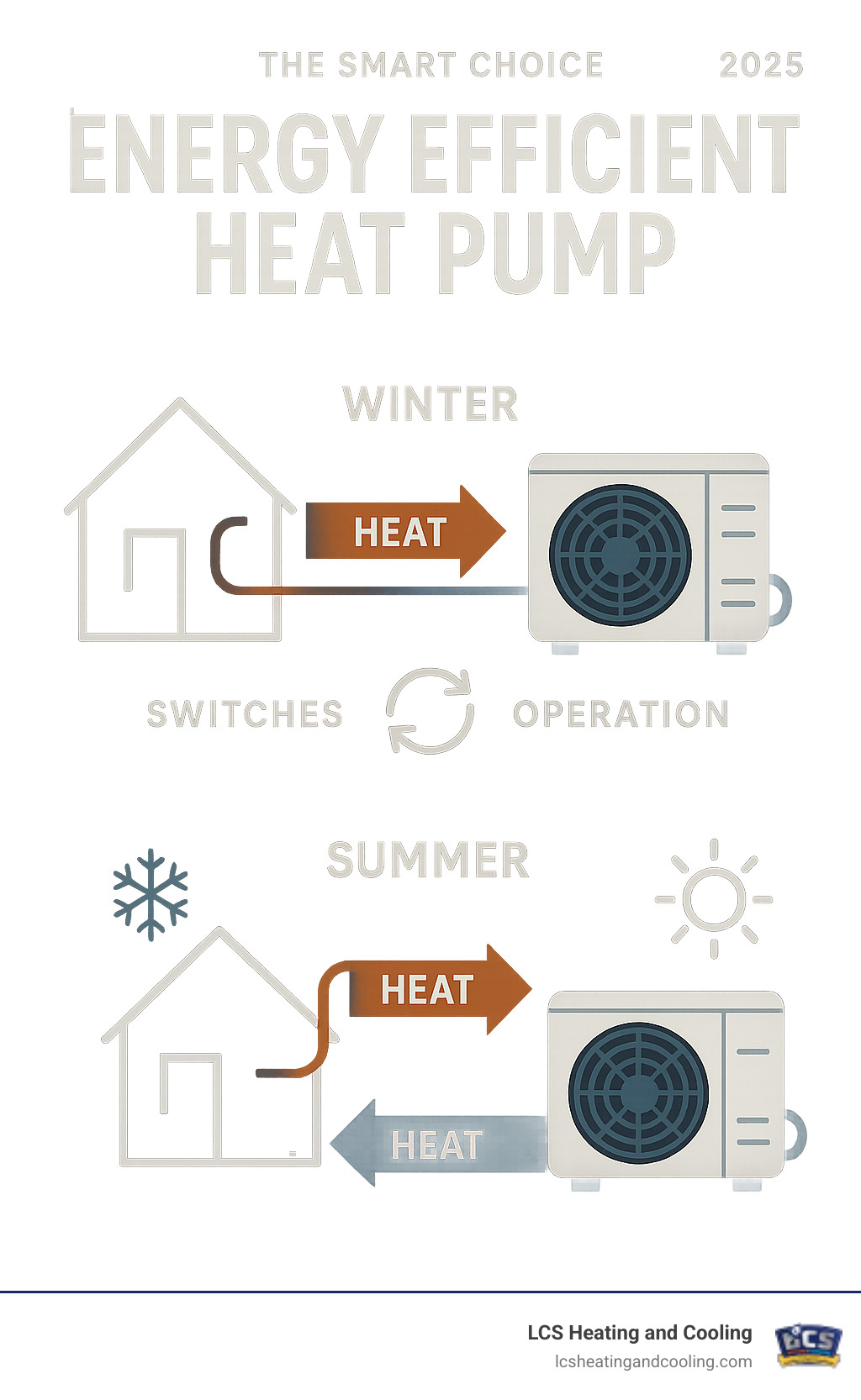
The All-in-One Solution: How Heat Pumps Provide Efficient Heating and Cooling
An energy efficient heat pump works on the same principle as your refrigerator: it moves heat from one place to another instead of generating it. This makes it far more efficient than traditional systems that burn fuel. Using a special refrigerant, a heat pump absorbs and releases heat as the fluid cycles through the system. A key component called a reversing valve switches the direction of this cycle.
In winter, the heat pump extracts heat from the outdoor air (even when it's cold) and moves it inside. In summer, the valve flips the process, pulling heat from your home and expelling it outdoors to keep you cool.
Want to dive deeper into the technical details? Check out this helpful resource: How Does a Heat Pump Work?
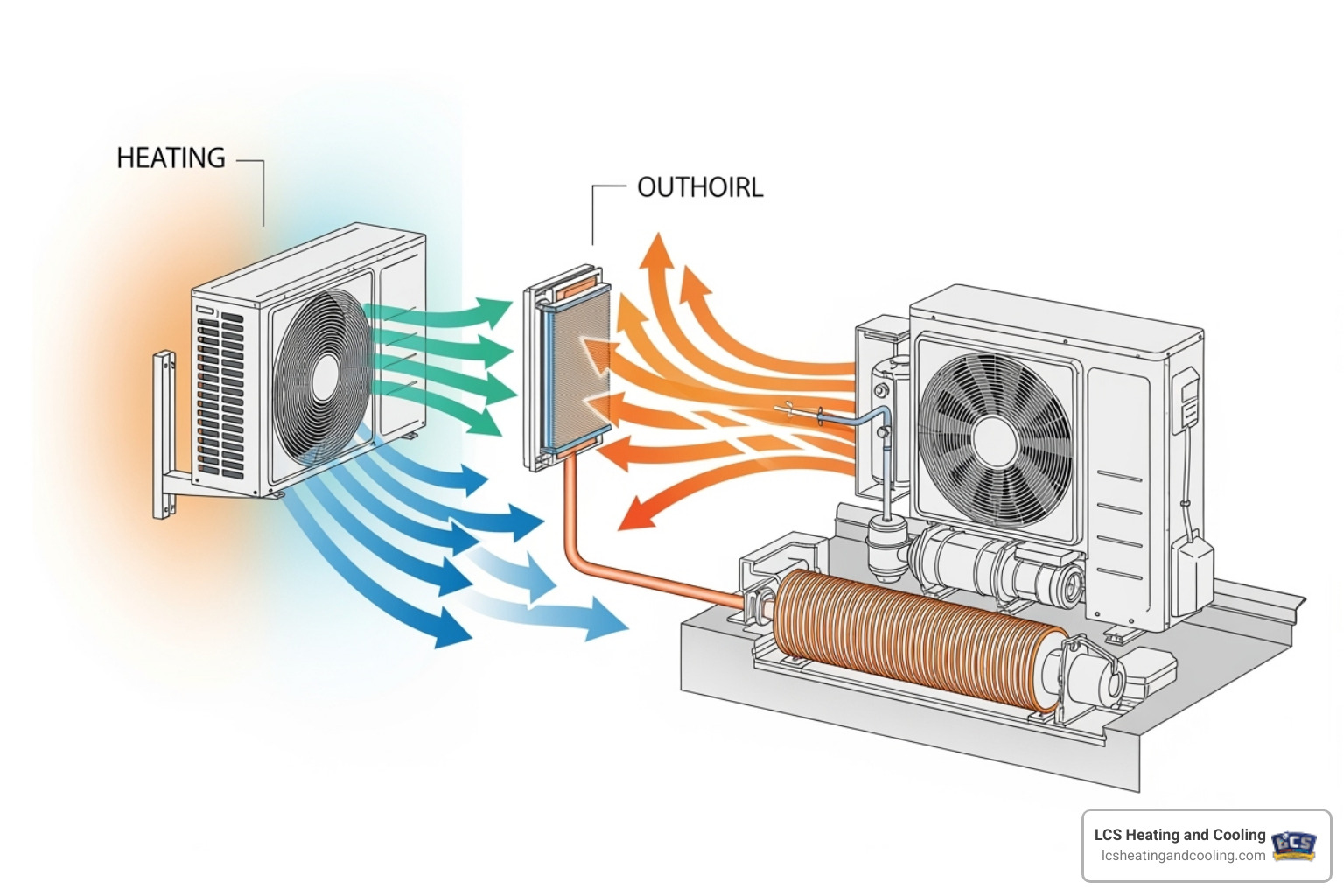
When shopping for a heat pump, you'll encounter three main types: air-source heat pumps that pull heat from outdoor air, ground-source (geothermal) heat pumps that tap into the earth's stable underground temperatures, and systems that can be either ducted (using your existing ductwork) or ductless (with individual units in each room).
How Air-Source Heat Pumps Work
Air-source heat pumps are the most popular choice for Indianapolis homes. Even on a cold winter day, there is heat energy in the outdoor air. The heat pump's outdoor unit captures this heat using a refrigerant that absorbs the energy, even below freezing. This heat is then concentrated and moved indoors to warm your home.
In summer, the process reverses. The heat pump acts as an air conditioner, pulling heat from your indoor air and moving it outside, keeping your home cool with less energy.
You may notice the outdoor unit making noise or releasing steam in winter; this is the automatic defrost cycle, which melts frost from the outdoor coil to maintain efficiency. Modern air-source heat pumps are well-suited for the Indianapolis climate.
Ground-Source vs. Air-Source Heat Pumps
While air-source systems are popular, ground-source (geothermal) heat pumps are another option for your energy efficient heat pump needs. The main difference is their heat source.
| Feature | Air-Source Heat Pump | Ground-Source (Geothermal) Heat Pump |
|---|---|---|
| Heat Source | Outdoor air | Stable underground temperatures (earth or water) |
| Installation Complexity & Cost | Simpler installation with outdoor and indoor units. Can often use existing ductwork. | More complex installation requiring underground loop system. Higher upfront cost. |
| Typical Efficiency (COP/EER) | HSPF: 7.1-13.2 (heating), SEER: 14-42 (cooling) | HSPF: 16-20+, SEER: 20-30+. More consistent efficiency year-round |
| Lifespan | 15-20 years | Indoor components: 20-25 years; Ground loop: 50+ years |
| Property Requirements | Minimal outdoor space needed | Sufficient yard space for ground loop installation |
Ground-source systems use the earth's stable underground temperature (around 55°F), making their efficiency consistent regardless of outdoor air temperature. While the required underground loop system means a more complex installation and higher upfront cost, the result is lower operating costs and greater energy savings over time.
Ducted vs. Ductless (Mini-Split) Systems
An energy efficient heat pump can be either ducted or ductless, offering different levels of flexibility.
Ducted systems use your home's existing ductwork to distribute conditioned air, making them a great replacement for a traditional furnace and AC. This provides whole-home comfort with improved efficiency.
Ductless mini-split systems are ideal for homes without ductwork or for homeowners who want zoned control. They consist of an outdoor unit connected to one or more indoor units mounted in specific rooms. Each indoor unit has its own thermostat, allowing for customized temperatures in different zones. This approach saves energy by only conditioning occupied spaces and is perfect for additions, converted garages, or finished basements where extending ductwork is difficult.

Decoding Efficiency: What Makes an Energy Efficient Heat Pump?
What makes an energy efficient heat pump truly efficient? It's not just marketing—it's a measurable quality that leads to lower utility bills. Think of efficiency ratings like a car's MPG: higher ratings mean lower operating costs.
The ENERGY STAR label is a key indicator of this. A system with the ENERGY STAR logo has been independently certified by the U.S. EPA to meet strict efficiency guidelines. This third-party verification gives you confidence that you're investing in a top-tier system. Choosing an ENERGY STAR certified model ensures you get maximum performance and comfort for every dollar spent on electricity. These high-efficiency heat pumps are designed to maximize performance while minimizing energy use.
Key Efficiency Ratings to Look For
Understanding efficiency ratings helps you make a smart investment. Here are the key metrics:
- SEER (Seasonal Energy Efficiency Ratio): Measures cooling efficiency over a season. A higher SEER (14+) means more efficient cooling. Top units can reach 42.
- HSPF (Heating Seasonal Performance Factor): Measures heating efficiency. Modern energy efficient heat pump models range from 7.1 to 13.2 HSPF, with higher numbers indicating better performance.
- COP (Coefficient of Performance): Shows how much heating/cooling energy you get per unit of electricity. A COP of 3 means the heat pump delivers three times more energy than it uses. Modern units maintain a COP above 1.0 even at 17°F, meaning they are always more efficient than electric resistance heat.
Ready to explore your options? You can browse thousands of certified models at Find ENERGY STAR Certified Heat Pumps.
Advanced Technology in an Energy Efficient Heat Pump
Modern energy efficient heat pumps feature advanced technology like variable-speed compressors (inverter technology). Unlike traditional single-stage systems that are either all on or all off, variable-speed units act like a dimmer switch, precisely adjusting their output to meet your home's needs. This continuous operation at lower speeds provides several benefits:
- Consistent temperature: Eliminates hot and cold spots for steady comfort.
- Lower energy use: Consumes only the necessary electricity, reducing heating consumption by up to 75% compared to electric resistance heat.
- Reduced wear and tear: Fewer on-off cycles mean a longer system lifespan.
- Superior dehumidification: Longer, slower run times remove more moisture from the air in summer.
Multi-stage compressors offer a step up from single-stage units with multiple operating levels, providing a balance of efficiency and affordability.
Special Features for Colder Climates
It's a myth that heat pumps don't work in cold climates like Indiana. Today's energy efficient heat pumps are engineered to thrive in freezing temperatures.
Cold climate heat pumps, often with an ENERGY STAR Cold Climate label, work efficiently in temperatures as low as -13°F (-25°C). They use advanced compressors and smart controls to maximize heating capacity in cold weather while maintaining high efficiency in milder conditions.
For most Indianapolis winters, your heat pump will handle your heating needs. For the most extreme cold, dual-fuel or hybrid systems are an excellent solution. These setups pair your energy efficient heat pump with a gas furnace. The heat pump acts as the primary heat source for most of the season. When temperatures drop below a preset point (usually 25-30°F), the system automatically switches to the furnace for backup heat. This ensures you always have reliable, cost-effective warmth.
Maximizing Your Investment: Installation, Maintenance, and Financial Perks
An energy efficient heat pump is a sophisticated investment, and its performance depends entirely on proper installation. A system that is improperly installed or sized will never achieve its rated efficiency, regardless of its SEER or HSPF rating. That's why working with a qualified contractor is critical.
At LCS Heating and Cooling, we use industry-standard Manual J calculations to size your system perfectly for your home's unique characteristics, including its layout, insulation, and windows. Before installation, we may also recommend weatherization improvements like sealing air leaks or adding insulation. These steps can reduce your home's heating and cooling load, potentially allowing for a smaller, more efficient heat pump.

Proper Sizing and Installation
Proper sizing is crucial for an energy efficient heat pump.
- Oversized systems will short-cycle (turn on and off frequently), leading to uneven temperatures, poor dehumidification, wasted energy, and premature wear.
- Undersized systems will run constantly without reaching the desired temperature, resulting in high energy bills and strain on the unit.
A professional assessment is the only way to ensure correct sizing. Our technicians perform detailed load calculations and evaluate your ductwork for proper airflow, ensuring your new system delivers the comfort and savings you expect.
Operational and Maintenance Tips for Your Energy Efficient Heat Pump
Simple maintenance will keep your energy efficient heat pump running smoothly:
- Filter Maintenance: A clogged filter restricts airflow and reduces efficiency. Check your filter monthly and clean or replace it every 1-3 months.
- Clear Outdoor Unit: Ensure at least two feet of clearance around the outdoor unit. Remove leaves, grass, snow, and ice to maintain proper airflow.
- Annual Professional Service: Schedule a yearly tune-up to clean coils, check refrigerant levels, and inspect electrical components. This preventative care maintains efficiency and prevents costly repairs.
- Smart Thermostat Use: Heat pumps work best with a steady temperature. Avoid large, frequent adjustments. Let the system manage fan speeds instead of using the "Auto" fan setting for optimal performance.
Rebates, Tax Credits, and Long-Term Savings
The financial benefits of installing an energy efficient heat pump are significant. You may qualify for federal tax credits of up to $2,000 for systems installed between 2023 and 2032. Local utility companies in the Indianapolis area often offer additional rebates.
The ENERGY STAR Home Upgrade platform is a great resource for finding available incentives.
The long-term savings are compelling. The average household spends about $1,900 annually on energy, with nearly half going to heating and cooling. An energy efficient heat pump can reduce your heating electricity use by up to 75% compared to electric resistance heating. This translates into lower greenhouse gas emissions and significantly reduced energy bills, making the initial investment a smart financial move.
Frequently Asked Questions about Heat Pump Efficiency
When Indianapolis homeowners start exploring energy efficient heat pumps, we hear the same thoughtful questions again and again. Let's explore the answers that matter most to Central Indiana families.
Are heat pumps effective in cold climates like Indiana?
Yes, modern energy efficient heat pumps are highly effective in Indiana's climate. Today's cold-climate technology has overcome the limitations of older models. Current heat pumps can efficiently extract heat from outdoor air even when temperatures drop to -13°F (-25°C), covering most of our winter days.
For the most extreme cold snaps, a dual-fuel (or hybrid) system is an excellent solution. This pairs your heat pump with a backup gas furnace, which automatically takes over when temperatures fall to a preset level. This gives you maximum efficiency for most of the season and reliable backup heat when you need it most.
How much can I really save with an energy-efficient heat pump?
The savings are substantial. An energy efficient heat pump can reduce your heating electricity use by up to 75% compared to electric resistance systems (like electric furnaces or baseboard heaters). Since heating and cooling account for nearly half of a typical energy bill, the impact is significant. High-efficiency models also provide superior dehumidification in the summer, adding to comfort and savings. Your exact savings will depend on your home's insulation, your previous heating system, and local utility rates, but most homeowners see a noticeable drop in their monthly bills.
What is the typical lifespan of a heat pump?
With proper installation and regular maintenance, an energy efficient heat pump is a durable investment. Air-source heat pumps typically last 15 to 20 years. Ground-source (geothermal) systems are even more long-lasting: the indoor components can last 20-25 years, and the underground loop can last for 50 years or more. The key to maximizing lifespan is professional installation and consistent annual maintenance to keep the system running efficiently and reliably.
Is an Energy-Efficient Heat Pump Right for Your Indianapolis Home?
After diving deep into heat pumps, you might be wondering if this technology is the right fit for your home. The short answer? For most Indianapolis area homeowners, an energy efficient heat pump is an incredibly smart investment that pays dividends in comfort, savings, and peace of mind.
Think about it: you get year-round comfort from a single system that quietly and efficiently keeps your family comfortable through sweltering summer days and frigid winter nights. No more juggling between separate heating and cooling systems or dealing with the inefficiencies of older technology.
The lower energy bills speak for themselves. When you can reduce your heating electricity use by up to 75% compared to traditional electric systems, those monthly utility bills start looking a lot friendlier. And with heating and cooling making up nearly half of most energy bills, these savings add up quickly.
There's also something satisfying about knowing your home has a reduced environmental impact. By moving heat rather than generating it, your energy efficient heat pump uses significantly less energy, which means fewer carbon emissions. It's a win for your wallet and a win for the planet.
Modern heat pumps have evolved far beyond the limitations of older models. With cold-climate technology, variable-speed compressors, and smart controls, they've become the smart, modern choice for home climate control. Whether you live in Indianapolis, Carmel, Fishers, Lawrence, Noblesville, or Zionsville, these systems are designed to handle our Midwest weather with remarkable efficiency.
The beauty of working with the right HVAC professionals is that you don't have to steer this decision alone. A proper evaluation takes into account your home's unique characteristics, your family's comfort preferences, and your long-term goals. That's where our expertise makes all the difference.
For a professional evaluation of your home's needs and a seamless installation backed by our 7-Star Concierge Service, trust the experts at LCS Heating and Cooling. We believe in clear communication, streamlined processes, and making sure you're informed every step of the way. After all, lasting comfort solutions are built on trust, expertise, and genuine care for our neighbors here in Central Indiana.
Schedule your professional heat pump installation in Indianapolis.
